Craig Turley, John Worsfold and Dean Kemp celebrate West Coast’s first premiership in 1992. Does it still take a super team?
The AFL might not be completely happy with how the game looks right now, but it would at least be satisfied the structure of its competition is ticking over pretty nicely.
There’s currently an evenness and a level of competitiveness across the board which probably hasn’t been matched.
Seven clubs have won flags this decade, and we may well end up with a different premier for a fifth season in a row. And if Adelaide hangs on to its spot in the top eight, or is replaced by its local rival, five different states will be represented in this year’s finals.
That’s the sort of snapshot of which any overseer of a national sporting competition would be pleased. And evidence enough that the institutionalised advantages and disadvantages which went hand-in-hand with the birth of the AFL have been and continue to be gradually eroded.
They still exist, of course, none more significantly than the MCG’s stranglehold on hosting the AFL grand final.
That alone made West Coast’s win in last year’s grand final epic against Collingwood significant. Had the Pies hung on for another couple of minutes, it would have been six grand finals in a row in which a Victorian team, aided by its familiarity with the MCG, had prevailed against a side from interstate.
But the Eagles’ win, only the second time in 15 seasons a non-Victorian club had beaten a local on grand final day, may in time come to be seen as another turning point in the competition’s evolution.
West Coast’s 2018 line-up wouldn’t (yet) be rated as highly as the Eagles’ first two premiership teams of 1992 and 1994, bursting with individual brilliance the calibre of Peter Matera, Dean Kemp, Glen Jakovich, Peter Sumich, Guy McKenna, Brett Heady, Chris Lewis and John Worsfold.
It wouldn’t rank alongside Brisbane’s hat-trick team of 2001-03 and its star-studded cast of Michael Voss, Simon Black, Jason Akermanis, Nigel Lappin, Justin Leppitsch, Chris Johnson and co. Perhaps not even Adelaide’s 1997-98 flag teams boasting the likes of Andrew McLeod, Darren Jarman, Mark Ricciuto, Shaun Rehn, Ben Hart and Nigel Smart.
Those three teams were responsible for all seven flags in a 12-season period won by non-Victorian clubs against Victorian opponents playing in their own backyard.
They also might inadvertently have created something of a false economy in which a non-Victorian club winning a premiership was seen to be less remarkable an achievement than it actually was.
The Eagles and the Lions of those eras were two of the greatest teams AFL football has seen. Adelaide’s ladder positions in 97-98 mightn’t have reflected greatness, but their amazing September campaigns two years in a row certainly did.
Truth is, the continued equalisation of the competition via the admission of two more clubs and various concessions has meant we’re unlikely to see “super teams” of their ilk, or Geelong of 2007-11 or Hawthorn of a few years ago again.
That might have made it harder for more “garden variety” quality AFL teams to win at a distant venue on grand final day. Alternately, perhaps the local opposition they face also isn’t quite as intimidating. And this September looks like being a good litmus test for either proposition.
The popular view is that a home state advantage in the 2019 finals series could be as critical as ever. But will it actually pan out like that?
Since the AFL name was officially adopted in 1990, we’ve had a total of 161 finals matches played between a home state team and one from another state.
The home teams have won 113 at a strike rate of a bit more than 70 per cent, with away sides winning 47 and one draw (Collingwood and West Coast in 1990). The strike rate hasn’t varied much over the entire journey. But a snapshot of the last 15 years provides some contrast.
In eight seasons from 2004-11, there were 39 finals between a local team and one from out-of-state, the home side winning 30 of them at just on 77 per cent. In the next seven seasons from 2012 until last year, there were 47 such finals, with the home side winning 33 but the visitors managing still to win 14, the win percentage for the home team down to 70 per cent.
Those 14 wins by away finals sides have included some of the most storied victories in AFL finals history. Like Hawthorn’s 2015 preliminary final triumph over Fremantle after having lost the qualifying final in Perth to West Coast two weeks earlier.
The Western Bulldogs pulled off two of them in their memorable 2016 march to a flag, knocking over West Coast at Subiaco, then Greater Western Sydney in the preliminary final on the Giants’ home deck. Sydney stunned Geelong at the MCG in the other preliminary final.
Then last year, the Eagles, for whom the MCG had supposedly been a hoodoo ground, shattered those reservations on the most important day of all. West Coast ended up winning eight of 11 games on the road last season, and so far in 2019 has five wins from eight starts away from its Optus Stadium home.
The prospect of interstate finals would faze them less than just about any rival. But they’re not alone in that confidence.
While Brisbane might be a finals novice, having not been part of September for 10 years, and would obviously prefer to be hosting a final at the Gabba, the Lions have won six of their 10 road trips to date in 2019, and three of the four losses have been by just 16 points or less.
Victorian teams, too, seem to be less intimidated by getting on a plane now than they used to be.
Top-of-the-table Geelong has had three wins from four starts interstate this season and lost the other by only 11 points. Richmond is 3-2 on the road this year and beat Fremantle in Perth when it was at its most undermanned.
And Collingwood, which has a history of against-the-odds interstate wins in finals as well as home-and-away games, is 3-1, having smashed Brisbane at the Gabba and only three weeks ago famously upsetting West Coast in Perth.
Yes, the finals odds will reflect which teams are lucky enough to host an interstate team, but neither are any of the participants this September just flat-track bullies whose price will spiral because it has to jump on a plane.
Travel these days, even come finals time, is just part and parcel of an AFL club’s lot. Their increasing capacity to cope with it means a more even playing field, and a greater likelihood of another important outcome, that the best team actually ends up winning.
*This article first appeared at INKL.

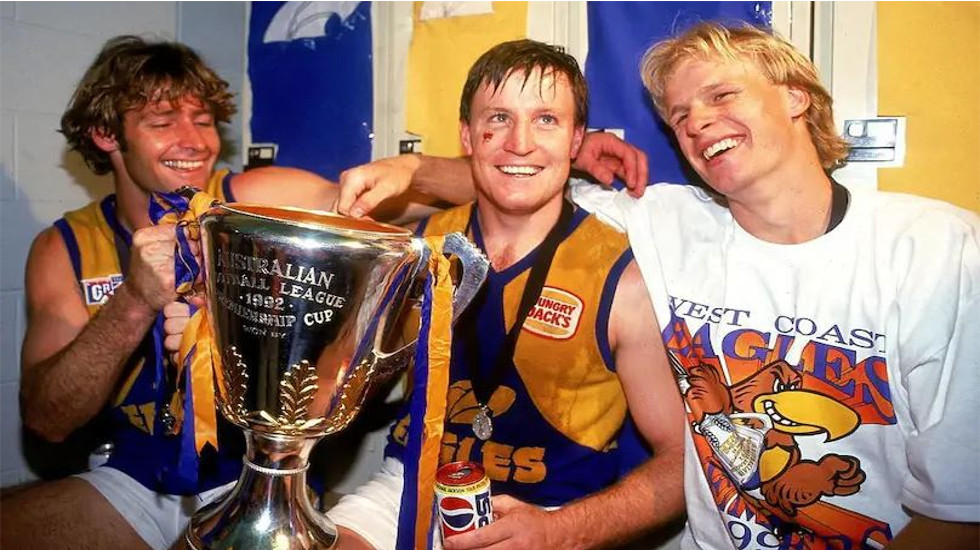
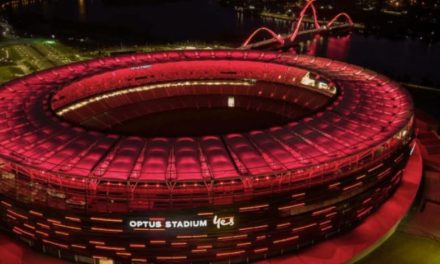
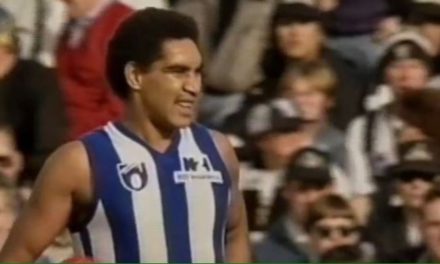
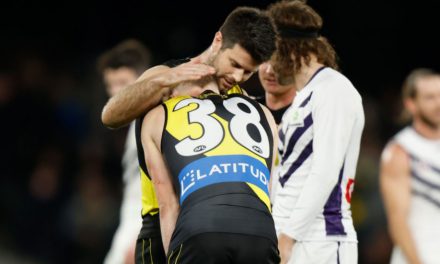
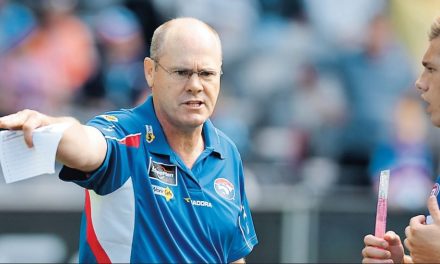






Would be funny as hell of Geelong start manipulating their wins and losses to rest up all their players and ensure that Richmond travel to either Perth or Sydney in the first week of finals.
The Cats really need to teach the Melbourne clubs and the AFL that they are not a satellite suburb, and deserve their hard won Kardinia Park advantage.